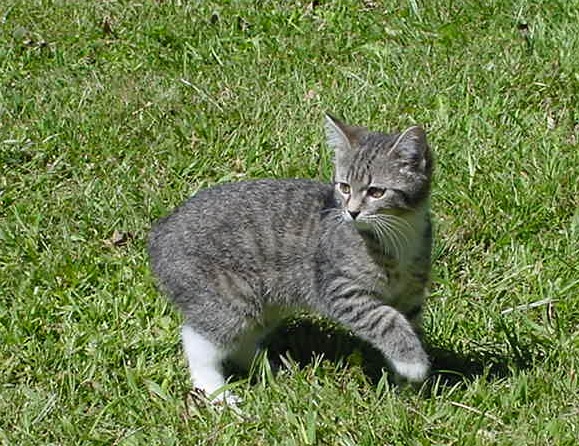|
We know prevention is the best medicine for keeping your pet companion happy and healthy.
We follow the AAHA/AAFP (American Association of Feline Practitioners) life-stage guidelines to provide the best recommendations for your cat.
|
|
|
Your Cat's First Year: Getting A Healthy Start
|
Just like humans, kittens need vaccinations to grow up healthy. At six weeks maternal antibody levels begin to fade, leaving kittens unprotected.
We recommend the following vaccination and testing schedule for most cats (some cats may have higher risk and require a customized schedule).
During each appointment the doctor will give you information on preventive care, life stage concerns, diet, training, and answer your cat care questions.
During these formative months, it is important to introduce your kitten to various people and other pets. Be sure to handle them frequently and acclimate them to nail trims and brushings.
|
 |
|
|
|
|
|
|
Between Six and Eight weeks:
FVRCP - An important vaccination against Feline Rhino-tracheitis, Calici- and Panleukopenia viruses. This vaccination requires 2 boosters (about 3 weeks apart).
FeLV & FIV Test - Tests for Feline Leukemia and Feline Immunodeficiency Virus which is the feline equivalent of the human AIDS virus.
Parasite Testing & Treatment - Intestinal parasites are common in puppies and can be fatal if not treated. In our area hookworms, whipworms, roundworms and tapeworms are common. Of these hookworms and roundworms can be transmitted to humans.
Heartworm Prevention - These potentially fatal parasites can be transmitted to your dog by a mosquito bite, and live in the heart. Heartworm disease is common in our area, during your appointment we will recommend a safe and effective preventative.
|
|
|
|
|
|
Between Nine and Eleven weeks:
FVRCP Booster #2
FeLV Vaccine - Protects cats against Feline Leukemia, the second leading cause of death in cats. This vaccination requires 2 boosters (about 3 weeks apart).
|
|
|
|
|
|
Between Twelve and Fourteen Weeks:
FVRCP Booster #3 (final booster, 1 year)
FeLV Booster #2
|
|
|
|
|
|
Between Fifteen to Sixteen Weeks:
FeLV Booster #3 (final booster, 1 year)
Rabies Vaccine (1 year) - A fatal viral disease of the nervous system which can be transmitted to humans. Rabies vaccination is required by state law. Boosters are also required within 72 hours if your pet is contacted by an animal of unknown vaccination history.
Flea/Tick Protection - Several options are available and our doctors will make specific recommendations based on your cat's lifestyle.
During each of these visits our doctors and staff will give you information on health care, diet and socialization, and answer any questions you have.
|
|
|
|
|
|
Between Four and Six Months:
Spay/Neuter - Veterinary studies have shown these procedures can significantly increase the lifespan of your pet.
Spay (female)
- Stops the two-week heats that occur each six months
- Eliminates the risk of unwanted pregnancies and uterine infections
- Greatly reduces the risk of breast and ovarian cancers
Neuter (male)
-Adds three years to life expectancy
-Reduces urine marking, roaming, and fighting instincts
-Reduces cancer and disease of the prostate and testes
|
|
|
|
|
|
Dental Care: Click here for more dental health information
Some of the most common, and most preventable conditions we see are periodontal disease and tooth injury. Studies show proper dental care adds an average of two years to a cats life.
Dental health is as important for our pets as it is for us. Since diet, lifestyle and breed disposition all play a part in periodontal disease progression, our doctors will make recommendations as needed for your pet.
|
|
|
|
|
|
Years 2 through 6: The Adult Cat
The AAFP places a focus on preventive medicine and testing through your cat's adult years. Vaccination boosters and regular health testing are vital to your kitty's health!
|
|
|
|
|
|
Annually:
- Physical examination
- Blood Profile
- Fecal Test to check for internal parasites.
- Urinalysis - Tests for early kidney disease, diabetes, and other systemic diagnosis.
- Deworming for cats who spend time outdoors
- Monthly Heartworm medication
|
|
|
|
|
|
Every other year:
-FeLV Booster (for at risk cats)
|
|
|
|
|
|
Every third year:
-Rabies Booster (using only the non-adjuvated vaccine)
-FVRCP Booster
|
|
|
|
|
|
Years Seven and Over: The Senior Years
|
|
|
During your cat's senior years, we place a focus on cognitive health, mobility, vision, and adequate appetite and hydration.
Annually:
- Physical Examination
- FeLV Booster (for at risk cats)
- Fecal Test - To test for intestinal parasites
- Urinalysis - Tests for early kidney disease, diabetes, and other systemic diagnosis.
- Blood Profile
- Monthly heartworm medication
|
|
|
|
|
|
Every third year:
- FVRCP Booster
- Rabies Booster (using only the non-adjuvated vaccine)
|
|
|
|
|
|
Growing Old
|
Just as in humans, the probability of illness and disease in cats increases with age. Kidney disease, heart disease, thyroid conditions, arthritis, diabetes, and cancer are common in senior cats.
As your cat reaches its senior years, early detection and proper medical care are the keys in providing a higher quality of life for your cat. Effective new treatments are available to reverse or effectively manage these conditions if detected early.
|
 |
|
|